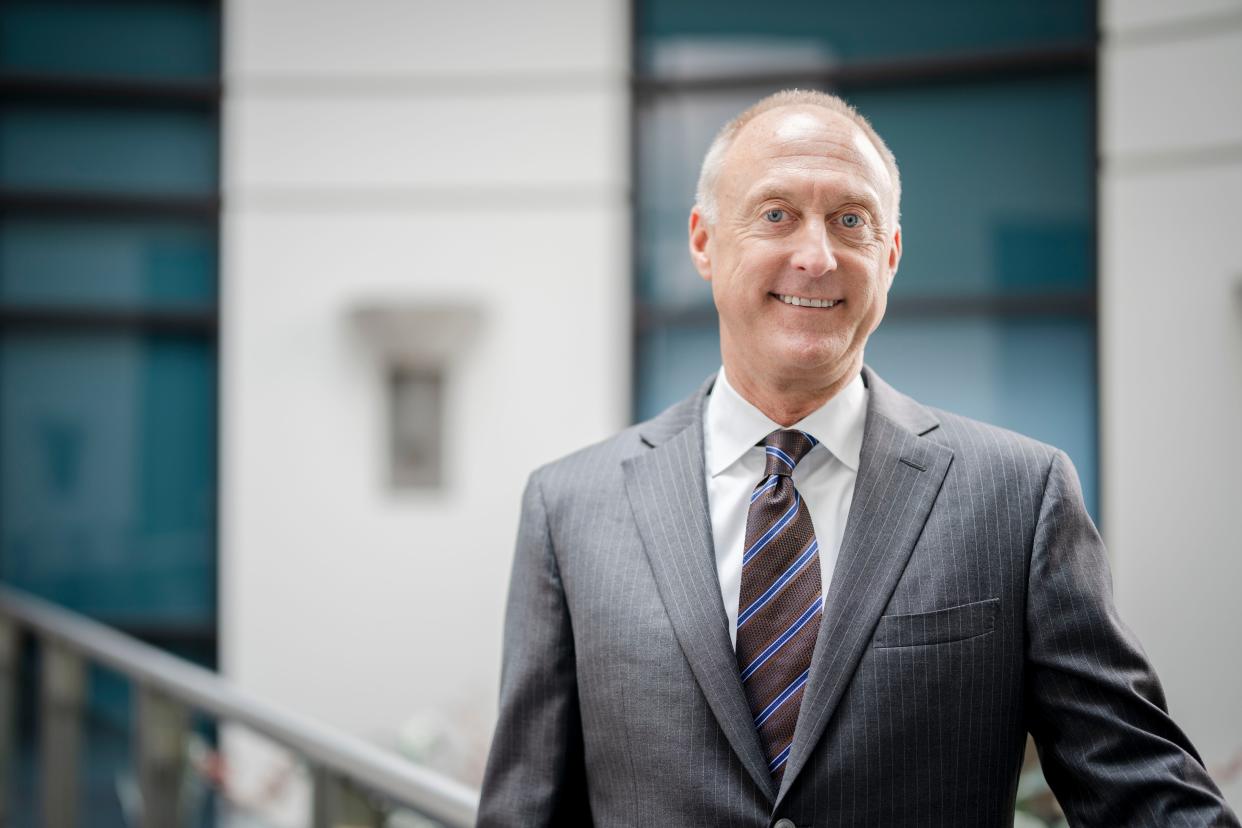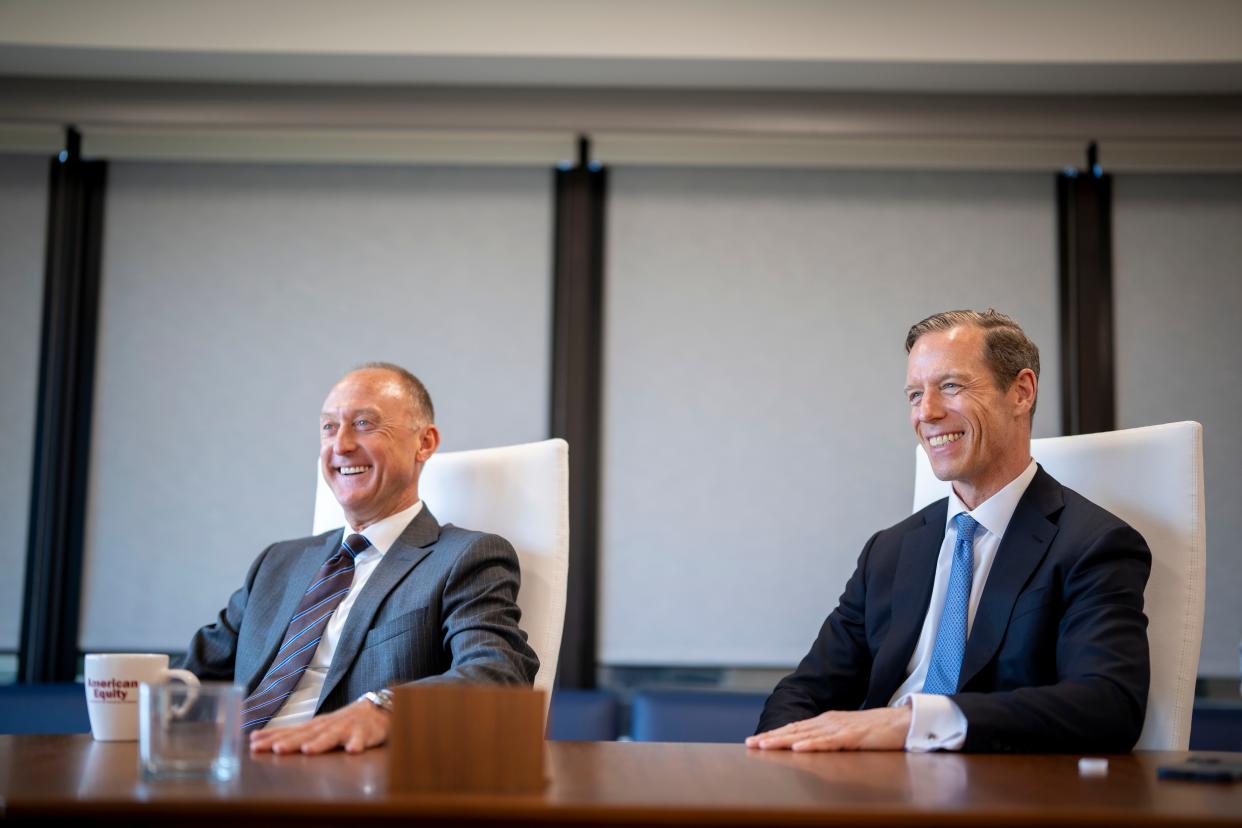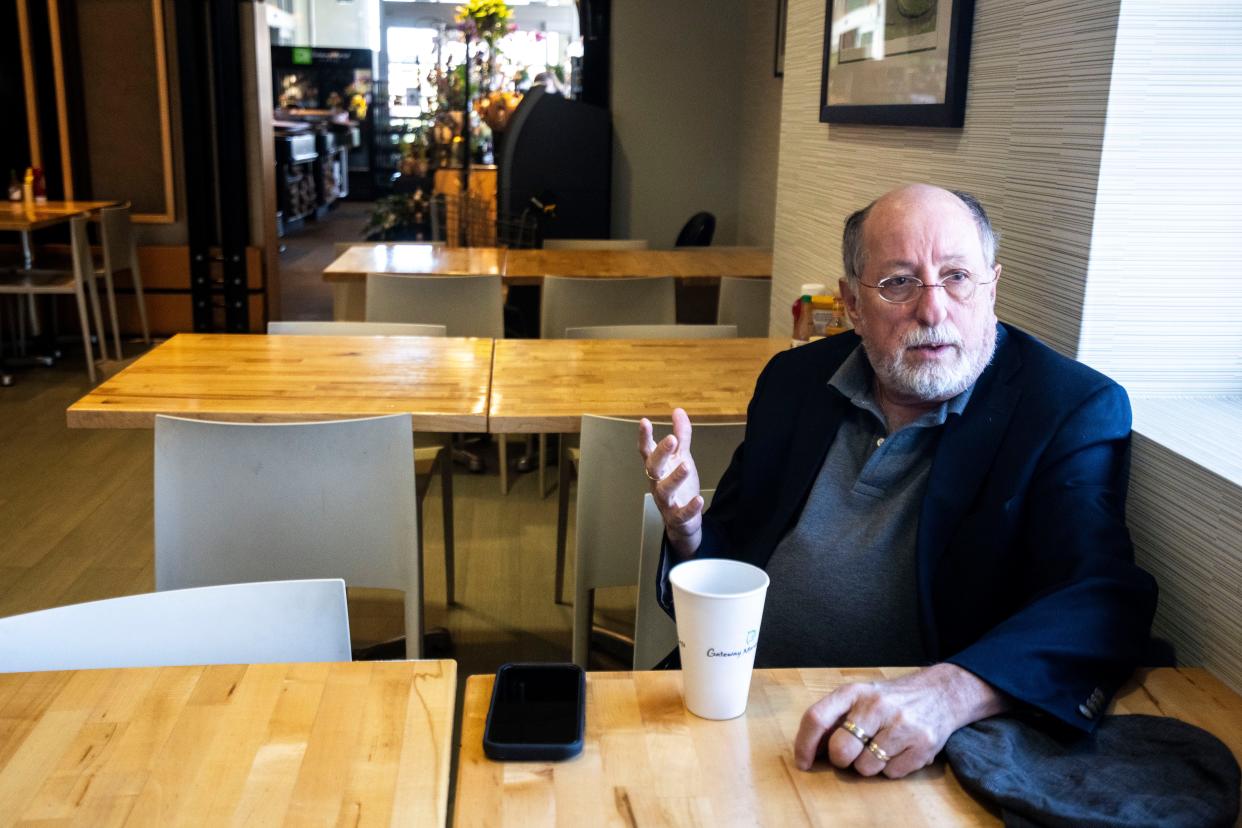Major insurance company moving to downtown Des Moines, a boost for office market, restaurants

Downtown Des Moines received a big boost Thursday when American Equity Investment Life Holding Co. announced that it will move its headquarters to the city center from the suburbs.
The company, acquired last week by Brookfield Reinsurance in a deal valued at $4.3 billion, will move from its West Des Moines offices by the time its current lease expires in fall 2025, CEO Jeffrey Lorenzen said.
Lorenzen added that he wants to improve the company’s culture by requiring hundreds of currently remote workers to return to the office. The company has about 1,000 employees, and he said the move should help “re-energize” downtown small businesses, an effort that local restaurateurs told the Des Moines Register they hope to see more of.
More: While growth flattens for most Des Moines metro financial firms, private equity booming
Commercial real estate agents, meanwhile, said a major company’s move downtown will add momentum to the central business district, where office vacancies that ballooned during the pandemic shutdowns have declined slightly since the beginning of the year. American Equity’s announcement comes as agents hawk hundreds of thousands of available square feet in buildings previously occupied by Wells Fargo and Nationwide Mutual Insurance Co.
“As a large corporate employer and a good citizen, we want to be able to support a vibrant downtown,” said Lorenzen, who became American Equity’s CEO last week after regulators approved Brookfield’s acquisition. “We think that’s important for the long-term success of Des Moines.”
Lorenzen declined to say specifically where the company is office hunting.
Most of the company's employees currently report to offices on Westown Parkway and in the West Glen Complex in West Des Moines, he said. Another one-third are outside central Iowa, and he said he wants to bring many of these employees to the region as the company cuts back on its remote work policy.

He said he hopes to have employees working in the West Des Moines offices at least three days a week by this fall, with a new policy in place whenever the company moves to a downtown office.
Michael McRaith, vice chair of Brookfield Reinsurance, described it as an investment in Des Moines' and Iowa's future.
“We’re going to invest in the community,” McRaith said. “We’ll support the state. We’re going to support our employees.”
‘Almost an unlimited source of capital’ coming to American Equity
Lorenzen said employees should expect more opportunities for career advancement under the new owner.
A spinoff of the Canadian Investment management firm Brookfield Corp., Brookfield Reinsurance also acquired Galveston, Texas-based American National, another large insurer, in 2022. Brookfield Reinsurance leaders say they want to double their assets under management to $200 billion in five years.
Lorenzen said Brookfield Reinsurance will invest enough in American Equity to make the company grow.
“We’ve always been limited by capital,” he said. “And now we have a source, almost an unlimited source of capital or means to get capital, that we didn’t have before. Capital is no longer an issue.”
McRaith declined to say whether Brookfield has set a specific dollar amount it plans to invest in American Equity Life over the next year, but said that “as Jeff and team develop the strategy, approach, and tactics to grow in the coming months, they’ll have the support they need from Brookfield.”
In particular, Lorenzen said, the company will need employees who know how to build new fixed indexed annuity products and tech platforms. He added that workers should be able to advance within the company as American Equity requires employees to return to the office.

The company, he said, started with a distinct culture when David Noble founded it in 1995. But in recent years, he said, it has focused more on strategy, without emphasizing the culture.
“By hiring people remote and never coming in the office, you never get that connection,” he said. “You never get that collaboration, building that trust and rapport you want to have to make good decisions. You want to have people in the office in Des Moines. Des Moines is where we’re going to be hiring people. It’s going to be our focus.”
Restaurant owners hold up hope for more office workers

Perhaps more than anyone, the central business district's restaurateurs understand how much office culture has vanished in Des Moines since the start of the COVID-19 pandemic a little over four years ago.
During a recent lunch shift, diners occupied about a half-dozen tables inside Bubba at 10th and Mulberry streets. About 20 patrons filed in to Malo a block east on Mulberry. And on Locust Street, a total of four customers were dining at Centro, leaving Frank Sinatra's voice bouncing off empty glasses and untouched white tablecloths on a Friday afternoon.
That used to be a prime time for the modern Italian restaurant. Employees walked over from their nearby insurance and banking offices, starting their weekends early with leisurely lunches and drinks.
Those were "the greatest days of my career," said Paul Rottenberg, president of Orchestrate Hospitality, the owner of Centro.
Business isn't all bad, restaurateurs say. Some companies are requiring employees to return to the office three days a week, so Tuesdays, Wednesdays and Thursdays are relatively busy. But Mondays and Fridays are often dead, with employees staying home or using their remote shifts to enjoy long weekends out of town.
Chris Diebel, co-owner of Bubba, said he still plans to keep the restaurant open seven days a week even if he knows he will lose money on some shifts. He doesn't want customers to wonder if the restaurant is open. He also doesn't want employees ― particularly those who work the weekend brunch shifts ― to look for steadier work elsewhere.
"I just don't think lunch is going to come back in a meaningful way any time soon," he said.
On Locust Street, at Americana, owner Scott Carlson said he is optimistic about his business's future. The lunch rush is gone, but although diners tend to arrive in small numbers, they stay longer. The old crowd used to arrive between 11:30 a.m. and noon, Carlson said. These days, his staff sees lunch customers until about 3 p.m.
Then there is happy hour ― or happy hours. Americana used to fill up around 5 p.m., Carlson said. Now, more patrons order mid-afternoon beers. Some end their workdays earlier. Others prepare for a relaxed final few hours in their home offices.
Carlson said he is not holding out hope that the old office crowd will return in pre-pandemic numbers.
"It's hard to hope for something to return that you have no control over," he said.
Malo closed temporarily in late April, as owner Todd Millang bought out the business from his former partners at Orchestrate Hospitality. When the business reopened May 3, a Friday, he met a friend there for lunch so he could monitor the traffic. When he arrived at 11:30 a.m., he said, he was the only diner in the restaurant. By 12:45 p.m., he estimates, diners occupied about a dozen tables.
Millang, who also is a commercial real estate agent, said the downtown office market is worse than the official statistics indicate. He said companies like Nationwide, Wellmark Blue Cross and Blue Shield and Principal Financial Group could lease space they own that they're not listing. He said other owners have to compete with these "shadow vacancies," lowering rental prices or simply decreasing the odds of actually securing a lease.
Rottenberg, the Orchestrate Hospitality president, added that the Krause Group's glass-walled office building on Grand Avenue "is pretty empty," as well, following the company's sale of its Kum & Go convenience store chain.
Millang estimates that about 200 cars are parked each day in the 1,800-stall Wells Fargo garage near Malo. Still, he said, he thinks more people will enter the area, eventually.
"At some point, the block and a half that Wells Fargo occupies is going to have more people," he said. "Hopefully sooner than later."
Official downtown Des Moines office vacancy numbers down
Wells Fargo employees, who once occupied four buildings downtown, all have moved to West Des Moines or into the company's NorthStar Building at 801 Walnut St., spokesman Mike Slusark said.
More: Wells Fargo will forgo $3.7 million in payments from Des Moines as employees leave downtown
But Principal ordered central Iowa employees to begin reporting to the office at least three days a week starting last November. Wellmark also has required employees to report to the office at least three days a week since September 2022.
Krause Group spokesperson Erica Turner said the company generally requires employees to work three days a week in the office. Turner said the company employs about 600 people in Iowa and in Italy, where its holdings include a hotel, vineyards and a pro soccer team.
The Krause Group has not listed any floors in its downtown office for lease. But Turner said Krause+, the company's real-estate arm, "is exploring opportunities to maximize use of the space."
Maverik, the company that bought Kum & Go from the Krause Group, rented 40,000 square feet inside Nationwide's 1100 Locust St. building last year. Company executives said they will maintain 250 workers in the building as part of the business's regional headquarters. The Des Moines City Council gave Maverik a 10-year grant worth $25,000 annually on the condition that employees work an average of three days a week in the office.
In the first quarter, according to CBRE Group, the office vacancy rate in Des Moines' central business district was 14%. The rate has not been that low since the end of 2019, months before the pandemic.
But CBRE Group Executive Vice President Tyler Dingel said the local commercial real estate market is still tough for building owners.
"There's just not a lot of buyers out there," he said.
Justin Lossner, senior managing director at Jones Lang LaSalle, said he believes more tenants and buyers will enter the market by the end of the year. At 801 Grand, which Principal owns, he said he has secured "multiple" pending leases, as well as three or four "real targets" looking for space.
More: Des Moines City Hall to be emptied. What will become of the historic building?
The building's average floor has about 22,000 square feet of space. But as Principal struggled to attract renters, Lossner said, his team began dividing the floors into smaller spaces of about 5,000 to 8,000 square feet last fall. He said the team has been able to lure a number of smaller tenants.
"You can't fill all the vacancy downtown 5,000 square feet at a time," he said. "But it sure builds momentum."
He said the Wells Fargo buildings are also attracting attention, with an out-of-state company mulling whether to buy all four.
Buyers may turn two of them ― 206 Eighth St. and 207 Ninth St. ― into hotels or apartments. The buildings aren't too big or wide, allowing contractors to divide the spaces into several rooms, each with access to a window.
More: Why did Des Moines' Financial Center ditch its hotel plan for apartments?
Builders can't flip the other two buildings, at 800 Walnut St. and 801 Walnut St., Lossner and Dingel said. Those floors are much wider, meaning designers would need to configure oddly shaped rooms to give each space a view of downtown.
Lossner said the spaces are still drawing interest, though.
"It's exciting, man," he said. "I've been busier in the last couple of months downtown than I have been in the last four years combined. And it's not even close."
Tyler Jett is an investigative reporter for the Des Moines Register. Reach him at tjett@registermedia.com, 515-284-8215, or on X at @LetsJett. He also accepts encrypted messages at tjett@proton.me.
This article originally appeared on Des Moines Register: American Equity Life will relocate to downtown Des Moines office
